March 9 – April 13, 2025
9:30 a.m. | Assembly Room
The call of the Gospel has always been to the impossible: resurrection. Resurrection presupposes death. It also dares to believe that death does not get the last word. A central question of this series, then, is this: In our moment, what might need to pass away so that the abundant life of Christ’s resurrection might be known?
Be linked in for Lent: each week small groups will study the same texts from a more personal and contemplative point of view, and Pastor Davis will preach them in Worship. Join us each Sunday morning as Nate Stucky leads the discussion in the Assembly Room.
Audio recordings will be posted below each class description.
 Nate Stucky serves as Director of the Farminary Project at Princeton Theological Seminary. He grew up on a farm in Kansas where his love for Christian faith and agriculture first took root. After earning a BA in Music from Bethel College (KS), Stucky spent six years doing ecumenical youth ministry on the eastern shore of Maryland, and two years farming back in Kansas. After farming, Stucky earned an MDiv and a PhD (Practical Theology, Christian Education and Formation) from Princeton Theological Seminary. His scholarship explores questions of land, ecology, theology, agriculture, justice, joy, and Sabbath as they relate to theological education. He is the author of Wrestling with Rest: Inviting Youth to Discover the Gift of Sabbath. Ordained in the Mennonite Church (USA), Stucky engages Farminary work as integral to his calling to teaching ministry. Nate and Janel along with their children Joshua, Jenna, and Isaac, have been worshiping at Nassau Church since 2016.
Nate Stucky serves as Director of the Farminary Project at Princeton Theological Seminary. He grew up on a farm in Kansas where his love for Christian faith and agriculture first took root. After earning a BA in Music from Bethel College (KS), Stucky spent six years doing ecumenical youth ministry on the eastern shore of Maryland, and two years farming back in Kansas. After farming, Stucky earned an MDiv and a PhD (Practical Theology, Christian Education and Formation) from Princeton Theological Seminary. His scholarship explores questions of land, ecology, theology, agriculture, justice, joy, and Sabbath as they relate to theological education. He is the author of Wrestling with Rest: Inviting Youth to Discover the Gift of Sabbath. Ordained in the Mennonite Church (USA), Stucky engages Farminary work as integral to his calling to teaching ministry. Nate and Janel along with their children Joshua, Jenna, and Isaac, have been worshiping at Nassau Church since 2016.
March 9 | Genesis 1:1-2:3
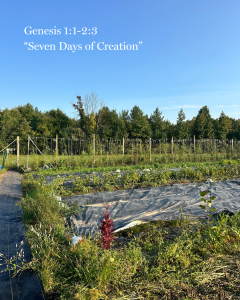 Seven-Day Creation
Seven-Day Creation
Seven-Day Creation (Genesis 1:1-2:3) During Lent our church community will journey together through Linked-In Learning, where adult education, small groups, and our preaching life intertwine. This week, we are reflecting on the very first story of the Bible, the story that started everything. What does it mean to reflect on creation during Lent, a traditional period of grief? Further, what does it mean to reflect on the creation story in the midst of ecological devastation, as wildfires and floods cause displacement and chaos? Perhaps the story may bring us to lament, to cry out for the abundant goodness we have commodified and extracted from the earth. Perhaps it will lead us to act, to make new resolutions to protect the holy greenness of this world we share. Whatever this deeply generative text brings us this week, we will remember that there is no creation without rest. As the land rests this winter, and as the soil lies fallow before producing new growth, let us treat our bodies gently as we learn from the creative God of rest.
📷 “Seven-Day Creation” by Lin Henke, from a photograph of The Farminary Project of Princeton Theological Seminary ©2025. Used by permission. All rights reserved.
March 16 | Genesis 2:4-25
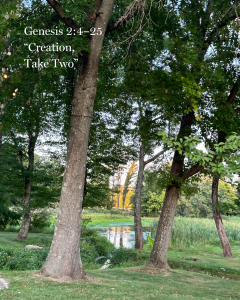 Creation, Take 2
Creation, Take 2
During Lent our church community will journey together through Linked-In Learning, where adult education, small groups, and our preaching life intertwine. Our text this week gives us a different account of creation, and a new perspective on our God who plants, tends, and nurtures. The second creation account is a rich text we can use to explore our identity as humans— formed of dust, vitalized by the breath of God. But it is also a profoundly ecological text, filled with nonhuman characters such as rivers and trees. What if we read the text with newfound attention to these characters? What might be the significance of a garden full of “every kind of tree?” The garden in Eden is not just a pretty pastoral scene, but an ecologically diverse old growth forest. God plants a garden that is resilient, harmonious, and delightful in its diversity. And God puts humans there to tend and to keep the garden. This Lent, how can we live out our vocation of nurture, reflecting the example of our Creator? How can we protect mature forests and diverse ecosystems? The second creation narrative draws us into these questions, and into our calling as tenders of the garden.
📷 “Creation, Take Two” by Lin Henke, from a photograph of The Farminary Project of Princeton Theological Seminary ©2025. Used by permission. All rights reserved.
March 23 | Genesis 3-4
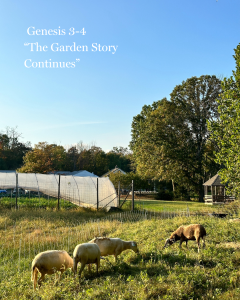 The Garden Story Continues
The Garden Story Continues
This week’s reading is a tough one. From our previous stories of creation and harmony we now see Eve and Adam, and later their children Cain and Abel, as they leave the garden and navigate being human in a complicated world. For the first time, feelings of scarcity, jealousy, and resentment are a part of our story. And these fears impact not just the human characters, but the nonhuman as well. The mature forest of Eden is replaced with thorns and thistles, sure signs of annual agriculture and thin topsoil. Soil itself shows its ability to cry out to God when it is soaked with Abel’s blood. These difficult passages invite us to sit with feelings of grief about the darker sides of our human experience. They may bring us closer to the ground, to listen to the cries of injustice that permeate our world. And yet, as we honestly face our grief, we can also find God in our midst, sewing us garments to keep us warm, and listening attentively to the voice of the soil. How might we meet the God who is both tender and just as we reflect on these stories?
📷 “The Garden Story Continues” by Lin Henke, from a photograph of The Farminary Project of Princeton Theological Seminary ©2025. Used by permission. All rights reserved.
March 30 | Exodus 16
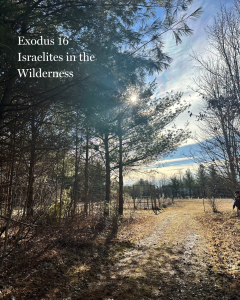 Israelites in the Wilderness
Israelites in the Wilderness
“Gather as much as you need.” It’s an old, old lesson, and it seems as hard for us as it was for the Israelites in the wilderness. In our story this week, God provides an abundance of food for the Israrelites as they travel through the wilderness in their exodus out of Egypt. As we reflect on manna from heaven, we might slow down and look for the gifts God has given us in our own lives, especially as plants begin poking up from the ground. Our land will once again bloom with more than enough food for all— will we store, or will we share? Will we learn the lesson of our God, and the lesson passed down by those indigenous to this land, to practice an honorable harvest? This week may our reflections lead us to gratitude, and may our gratitude lead us to generosity.
📷 “Israelites in the Wilderness” by Lin Henke, from a photograph of The Farminary Project of Princeton Theological Seminary ©2025. Used by permission. All rights reserved.
April 6 | Luke 9:1-9
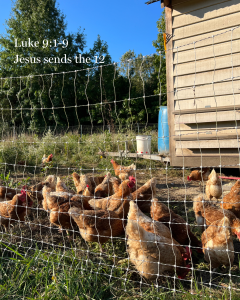 Jesus Sends the Twelve
Jesus Sends the Twelve
In this week’s reading, Jesus sends the twelve out into the villages, to proclaim and to heal. By asking the twelve to take nothing with them, Jesus calls his followers to courageously trust the communities they enter. Through this Lenten series, as we have reflected on stories from the garden of Eden to the Israelites in the wilderness, we have repeatedly encountered humans who refused to trust in the abundance of God. We know how hard it can be to trust our neighbors, to trust strangers, to trust that there is enough. But by answering Jesus’ call to go out with nothing, the disciples take on a posture of dependence, both with their fellow humans and with the more than human world. This week, how can we lean into our dependence on others? How can we let ourselves be nourished by the God of soil and rich harvest, the God who asks for nothing in return?
📷 “Jesus Sends the Twelve” by Lin Henke, from a photograph of The Farminary Project of Princeton Theological Seminary ©2025. Used by permission. All rights reserved.
April 13 | Luke 22:1-23
The Last Supper
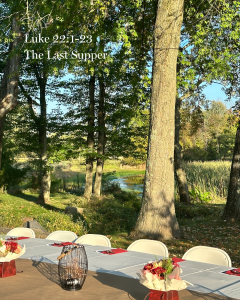 Remember me. We’re nearly at the end of our Lenten journey, in our sixth week of reflecting on the relationship between resurrection hope and God’s beautiful creation. As Jesus holds up the bread and the wine at the last supper, we might remember all we’ve witnessed along the way— the abundant fruit of the garden, bread in the wilderness, God’s call again and again to move into interdependence. We might remember all the ways we’ve failed to heed this call, from Abel’s blood crying out from the soil all the way to Judas, poised to betray. The Last Supper invites us into grief, and our grief lives close to hope. When we remember Jesus, we remember a long history of land and food, a history soaked in blood and blooming in possibility. Where will this remembrance take us? What is possible when we let ourselves be moved?
Remember me. We’re nearly at the end of our Lenten journey, in our sixth week of reflecting on the relationship between resurrection hope and God’s beautiful creation. As Jesus holds up the bread and the wine at the last supper, we might remember all we’ve witnessed along the way— the abundant fruit of the garden, bread in the wilderness, God’s call again and again to move into interdependence. We might remember all the ways we’ve failed to heed this call, from Abel’s blood crying out from the soil all the way to Judas, poised to betray. The Last Supper invites us into grief, and our grief lives close to hope. When we remember Jesus, we remember a long history of land and food, a history soaked in blood and blooming in possibility. Where will this remembrance take us? What is possible when we let ourselves be moved?
📷 “The Last Supper” by Lin Henke, from a photograph of The Farminary Project of Princeton Theological Seminary ©2025. Used by permission. All rights reserved.
